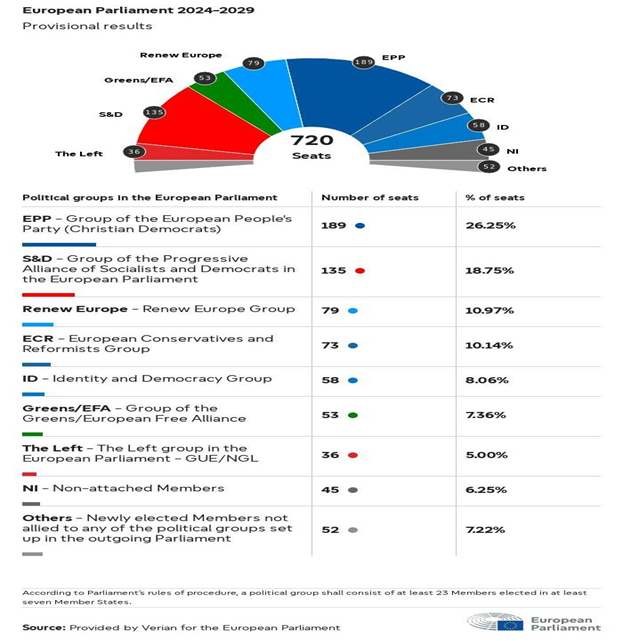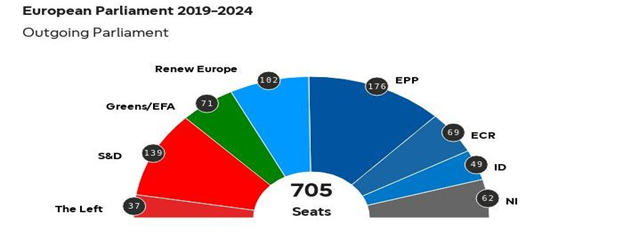
Indian Council of World Affairs
Sapru House, New DelhiKey Takeaways from the EU Parliament Elections 2024
The European Union (EU) Parliament elections were held from 6-9 June 2024. The results indicate a divided European Parliament (EP) which is likely to encounter delays while passing laws on pertinent issues such as immigration, climate, and defence, among others. This viewpoint outlines the significance of EU parliamentary election and key trends that are likely to shape European politics in the next five years.
Background
The EP is the legislative branch of the EU and constitutes an important supranational forum for political debates and decision-making within the EU. Together with the representatives of the governments of the Member States in the Council, the EP plays an important role in adopting new EU laws along with the Council.[1] Although, the EP is not the main EU institution dealing with foreign policy, the manner in which political groups align post the elections do have significant implications for the functioning of the European Commission.[2] The Members of the EP (MEPs) are directly elected by 450 million voters residing in 27 member states. It is important to note that the number of MEPs from each country is “based on the principle of degressive proportionality, which means each MEP from a larger country represents more people than an MEP from a smaller country”. Countries with highest number of MEPs share include Germany- 96; France: 81; Italy: 76; Spain: 61; Poland: 53. With 6 MEPs, Malta has the minimum number of MEPs. [3]
This year, votes were cast to decide the fate of 720 seats (15 more seats than in 2019)[4] and the voter turnout was registered at 51 percent. As the results poured in, it was clear that the Centre Right European People's Party (EPP) has consolidated its position by securing 189 seats in the Parliament. With 135 seats, Socialists and Democrats (S&D) are in second place. Notwithstanding a loss of 4 seats since 2019, the S&D have shown stability in terms of their performance in the Parliament. However, Renew Europe, which has been a traditional coalition partner for EPP and S&D, has lost 23 seats compared to 2019. With about 14 percent of the Parliament's seats in the last election, Renew had spent most of the previous term acting as a kingmaker.[5]

Source: European Parliament

Source: European Parliament
The two countries with maximum MEPs share in the EP- France and Germany have witnessed a significant electoral shift to the right. In France, President Emmanuel Macron’s Renaissance Party has lost to far right National Rally Party of Marine Le Penn. President Macron has responded by dissolving the country's National Assembly and has called for snap elections, two rounds of voting for which would take place on 30 June and 7 July. Meanwhile, Chancellor Olaf Scholz's the Social Democrats Party in Germany has secured third position, even behind the far-right Alternative for Germany (AfD). While President Macron and Chancellor have faced major setbacks, Italian PM Giorgia Meloni’s Brothers of Italy party has won with 28 percent vote share. As a result, she would dominate the European Conservatives and Reformists (ECR) in EP, which would make her the main power broker in Strasbourg. The election win, along with the G-7 Summit that Italy hosted, has boosted PM Meloni’s image in Europe.
Key Takeaways
The results of the 2024 election indicate certain trends that would guide the European agenda for the next five years.
First, the centre right European People's Party (EPP) has emerged as the biggest winner and will play an important role in the European parliament. The EPP has secured 189 of the 720 seats-13 more seats than in 2019. In this respect, the EPP is in the best position to set the direction of EU policymaking process in the next five years.
The EPP’s performance has strengthened the consensus around a second term for Ursula von der Leyen as the European Commissioner but not without its challenges. She requires the support of 361 MEPs from coalition partners such as the S&D and the Renew. In case she does not meet the threshold, she would have to make tough choice such as aligning with the Greens or seek support from ECR Group which is dominated by PM Giorgia Meloni’s party. If reelected, Ursula von der Leyen is likely to retain her earlier coalition with the S&D and renew. This coalition[6] is also crucial for her to negotiate a working relationship with the far right.[7]
So far, no name has been made official owing to divergences in terms of allocation of posts among EPP’s coalition partners. One major contention is among EPP and S&D about the post of European Council President. While EPP has proposed the tenure to be divided to 2.5 years in order to ensure a place for its candidate, the S&D is rooting for former Portuguese PM Antonio Costa to become the European Council President for a full term.[8]
Malta’s Roberta Metsola and Estonia’s Kaja Kallas are expected to be appointed as the Head of the European Parliament and Foreign Policy Chief respectively.[9]
Second, and perhaps the most important trend is that the far-right parties have made significant gains. This reflects a rising discontent against EU laws on immigration, climate change, war, etc among the residents of different member states. Taken together, the far right has emerged as a dominant force within the EP. However, the rise is limited to a few states and is less than what had been projected before the elections. Moreover, internal divisions within right wing also prevail which would ultimately check their influence in the EP.
The right wing gains would also have implications for EU’s support for Ukraine. Many voices within this spectrum are opposed to unconditional assistance to Ukraine which in turn is likely to further the Ukraine fatigue within EU. At the same time, Kaja Kallas’ appointment as the EU Foreign Policy Chief would imply a strong policy towards Russia.
Third, With 53 seats (loss of 18 seats), the Greens have fared poorly due to the biggest losses they suffered in France and Germany and Austria, leading to losses for Greens/European Free Alliance (EFA) in the EP. This development would have implications for the environmental policies backed by the Group within EP.[10] The slump in the performance of Greens in this year’s election reflects a “diminishing salience of climate change among European voters, when compared with other concerns such as the economy”.[11]
Conclusion
The 2024 European Parliament elections indicate electoral shift to the right in many countries such as France, Germany, Italy and Austria at the expense of centre-left and green parties. The rise of right wing politics reflect the changing contours of European politics at a time when concerns over immigration policy, climate action, the war in Ukraine, etc. have divided the population in different member states.
However, it is important to note that the rise in right wing has been relatively less than what had been projected before the elections. In terms of decision-making too, the overall impact of right wing affiliated MEPs would remain in check owing to internal divisions among different right and far right groups.
Overall, the results indicate a much more polarised parliament which would face delay in the passing of EU legislation on climate change energy, migration, among others.
*****
*Dr. Himani Pant, Research Fellow, ICWA.
Disclaimer: Views expressed are personal.
Endnotes
[1] European Parliament, https://www.europarl.europa.eu/about-parliament/en/home, Accessed on 11 June 2024
[2] Kevin Cunningham et al. A sharp right turn: A forecast for the 2024 European Parliament, 23 January 2024, electionshttps://ecfr.eu/publication/a-sharp-right-turn-a-forecast-for-the-2024-european-parliament-elections/ Accessed on 13 June 2024.
[3] https://elections.europa.eu/en/how-elections-work/
[4] Parliament’s composition is examined before each election, in line with the principles set out in the Treaties (i.e. a maximum of 750 MEPs plus the President, no less than 6 and no more than 96 seats for any EU country, and the “degressive proportionality” principle), and based on the most recent population figures. The number was increased to 720 from 705 owing to demographic changes following Brexit since the last election that was held in 2019. For details seehttps://www.europarl.europa.eu/news/en/press-room/20230911IPR04910/2024 europea n-elections-15-additional-seats-divided-between-12-countries
[5]5 things to know about the EU election results, Politico, 10 June 2024, https://www.politico.eu/article/eu-election-results-2024-things-to-know/ Accessed on 13 June 2024.
[6] EU Policy. What went wrong for the EU election-losing Greens and Liberals? Euronews, 10 June 2024, https://www.euronews.com/green/2024/06/10/what-went-wrong-for-the-eu-election-losing-greens-and-liberals Accessed on 13 June 2024
[7] AITOR HERNÁNDEZ-MORALES AND HANNE COKELAERE5 things to know about the EU election Politico 10 June 2024 resultshttps://www.politico.eu/article/eu-election-results-2024-things-to-know/ Accessed on 12 June 2024
[8] https://www.dw.com/en/eu-leaders-discuss-commission-jobs-in-post-election-summit/a-69381320
[9] https://www.politico.eu/article/leaders-fail-to-agree-on-von-der-leyens-second-term/
[10] EU leaders discuss Commission jobs in post-election summithttps://ww w.euronews.com/green/2024/06/10/what-went-wrong-for-the-eu-election-losing-greens-and-liberals
[11] 5 key takeaways after far right surges in European Parliament elections, Washington Post, 10 June 2024https://www.washingtonpost.com/world/2024/06/10/european-parliament-election-results-takeaways/ Accessed on 13 June 2024.















